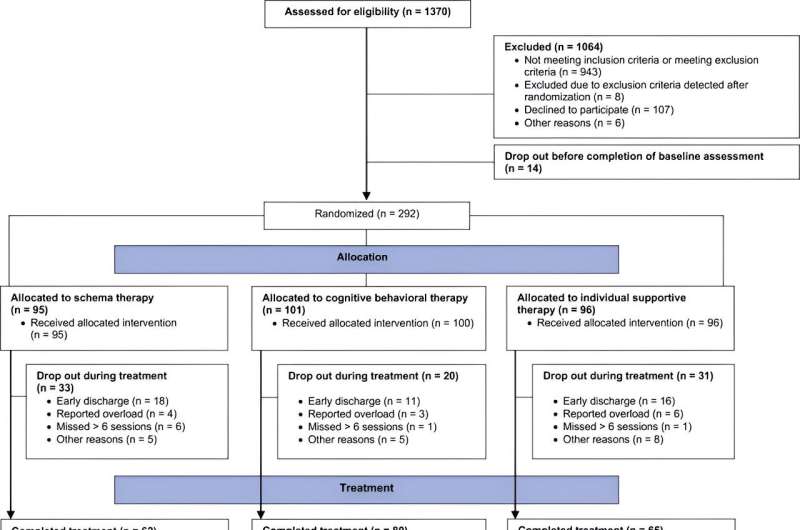This article has been reviewed according to Science X's editorial process and policies. Editors have highlighted the following attributes while ensuring the content's credibility:
fact-checked
trusted source
proofread
Researchers demonstrate clinical benefits of schema therapy for inpatient treatment

Schema therapy is increasingly being used as a psychotherapeutic method. The focus here is on early childhood experiences and emotions that contribute to current symptoms and mental disorders. So far, the effectiveness of schema therapy for depression has been examined only in outpatient settings.
Researchers at the Max Planck Institute of Psychiatry (MPI) have now filled this gap and, in the context of the OPTIMA study, tested its effectiveness for treating severe depression in an inpatient setting. The research is published in the journal Psychotherapy and Psychosomatics. The results provide scientific evidence for its frequent use: Clinically, schema therapy was no less effective than cognitive-behavioral therapy, the current most effective psychotherapeutic treatment.
To test the effectiveness of schema therapy, researchers compared it with cognitive behavioral therapy (CBT) and individual supportive therapy (IST). CBT is the standard psychotherapeutic treatment for depression, while IST is a nonspecific supportive therapy. CBT and IST served as control conditions in the study.
Study participants were randomly assigned to one of the three therapies. After seven weeks, as well as six months after the end of treatment, psychologists used questionnaires to assess symptoms such as depressive mood, pessimism or loss of energy. The researchers did not find any clinically relevant difference between the schema therapy group and the two control groups. Accordingly, after almost two months, schema therapy was just as effective for treating severe depression as CBT and IST.
"Our study proves for the first time that schema therapy is also effective for severely depressed inpatients—until now, it has only ever been tested in outpatient settings," says lead author Johannes Kopf-Beck. On average, inpatients are more severely ill than outpatients.
They also often suffer from other mental disorders in addition to depression. For such complex clinical cases, standard psychotherapeutic treatments are not always sufficient. It is, therefore, important to have effective alternatives such as schema therapy.
With almost 300 participants, this study is the first and largest in an inpatient setting to date. It is also uniquely extensive: In addition to depressive symptomatology and other symptoms, biological parameters such as sleep behavior were recorded, physical activity was measured, and images of the brain were taken. In addition, blood samples were drawn from the patients in order to evaluate genetic information, among other things.
This large amount of data still needs to be analyzed and holds great potential, "We hope to use the collected data to find certain subgroups of depressed patients for whom schema therapy is particularly suitable," explains Samy Egli, senior psychologist at the MPI. The researchers are also still exploring the long-term effects of schema therapy and will continue to collect data up to four years after the end of the treatment.
More information: Johannes Kopf-Beck et al, Effectiveness of Schema Therapy versus Cognitive Behavioral Therapy versus Supportive Therapy for Depression in Inpatient and Day Clinic Settings: A Randomized Clinical Trial, Psychotherapy and Psychosomatics (2024). DOI: 10.1159/000535492




















